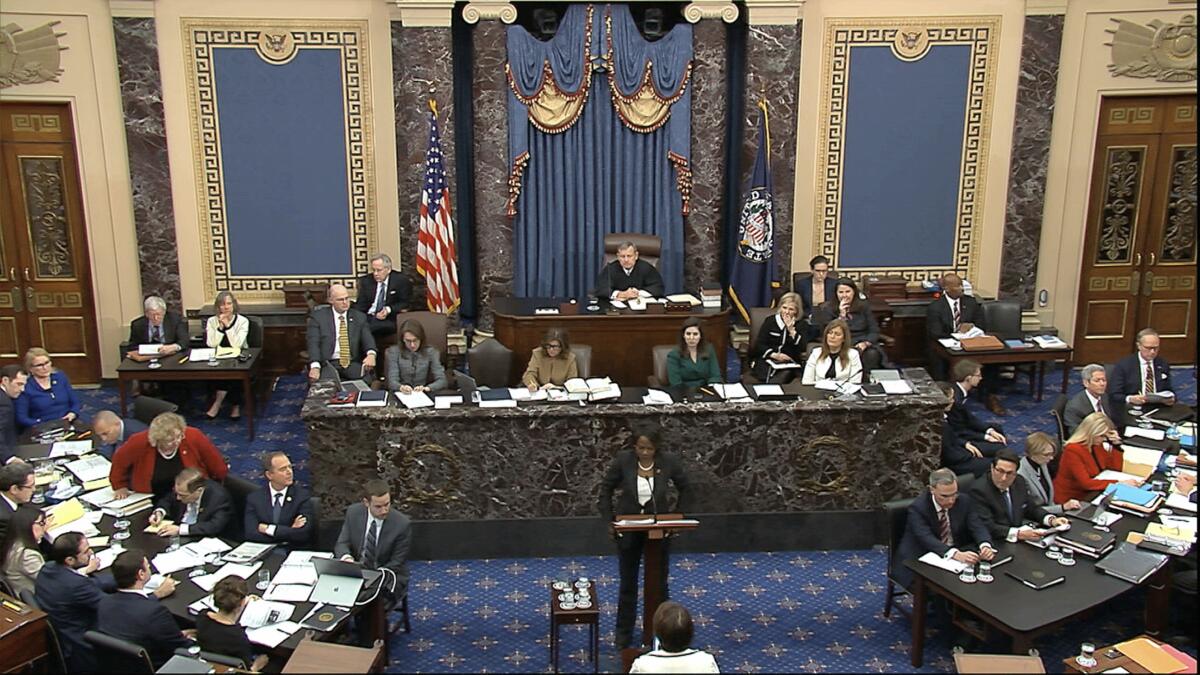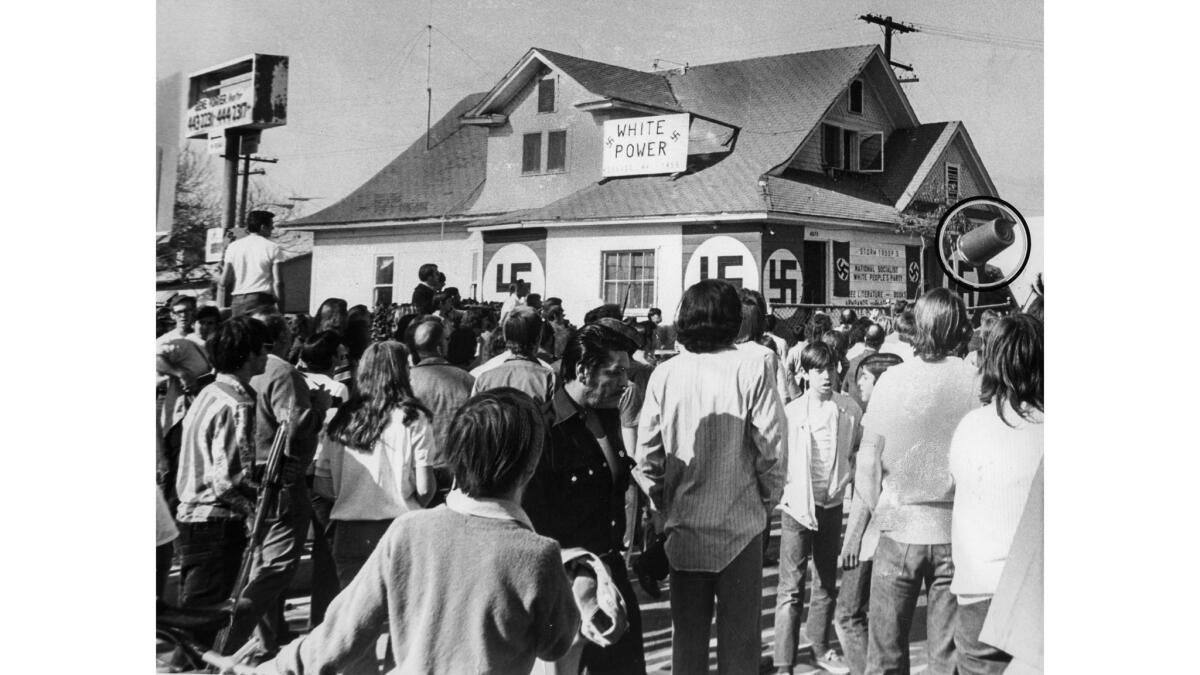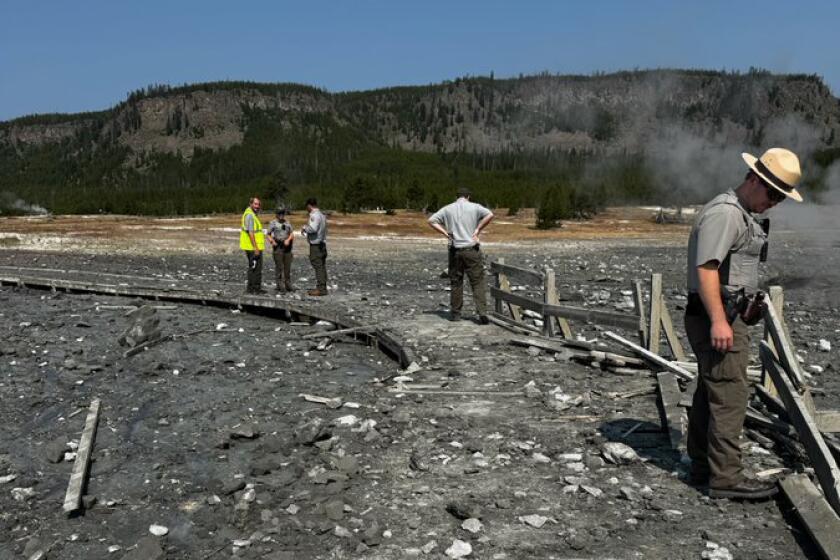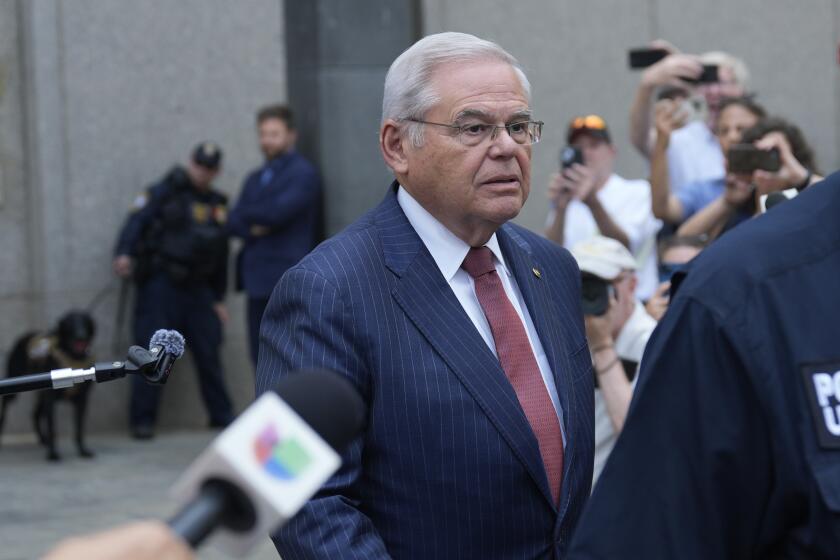Newsletter: Can they get a witness?

The push to summon witnesses in the Senate impeachment trial of President Trump appears to be sputtering.
TOP STORIES
Can They Get a Witness?
Former national security advisor John Bolton loomed large in Democratic senators’ inquiries during the question-and-answer phase of President Trump’s impeachment trial yesterday and could very well again today, but Republicans are increasingly confident that by the end of the week they will have the votes to turn away calls to subpoena him and other witnesses.
The key question now facing the Senate is whether to move toward an acquittal vote — which some GOP leaders say could take place as early as Friday — or vote to hear testimony from Bolton and perhaps others.
Democrats would need to persuade four Republicans to cross the aisle and vote with them to subpoena witnesses and start a debate over who should testify. Although Sens. Mitt Romney and Susan Collins have indicated they are likely to want to hear from Bolton, it is unclear whether there will be two additional GOP votes.
More Politics
— Trump, who is notable for his light public schedule, is suddenly engaged in a blitz of activity, hoping to make the case to Americans that he is busy running the country while Democrats are engaged in a partisan attempt to take him down. Yesterday, he signed the new U.S.-Mexico-Canada Agreement, known as USMCA, into law.
— With Sen. Bernie Sanders gaining traction, his rivals for the presidential nomination and other top Democrats have begun aggressive efforts to slow the favorite of the party’s progressive wing, fearing he may become unstoppable and cost Democrats their shot at retaking the White House in November.
— As Secretary of State Michael R. Pompeo heads to Kyiv, Ukrainians seem to be patiently accepting that they must grin and bear it, and deal with their very difficult ally, for better or worse.
Besieged by a Deadly Virus
Chinese scientists racing to keep up with the spread of a novel coronavirus have declared the widespread outbreak an epidemic, revealing that in its early days at least, the disease’s reach doubled every week. They are also closing in on the source of the aggressive new germ: bats.
Meanwhile, a plane carrying 200 American citizens out of Wuhan, China — the center of the outbreak — has landed at March Air Reserve Base in Riverside County. There seemed to be no rhyme or reason as to who was tapped by U.S. officials to board the flight. For many Americans still in Wuhan, there’s a mixture of fear, tears and anger.
After Tragedy, a Debate Over Technology
Should helicopters like the one in which Kobe Bryant and eight others perished be required to have warning systems that alert pilots when they are flying dangerously close to the ground? It’s a question that has divided federal regulators for years. The National Transportation Safety Board has argued for a decade and a half that the systems prevent crashes and should be mandatory in helicopters that can accommodate six or more passengers. The Federal Aviation Administration has turned those efforts aside.
‘What Did I Do?’
Thousands of students from Iran come to the U.S. to study at American colleges each year. But now, students and lawyers say, immigration authorities seem to be singling them out without clear reasons. At least 16 students with valid visas have been sent home upon their arrival since last August. Others were subject to long, grueling interviews. Said one en route to Santa Barbara to pursue a PhD and rejoin his wife: “I have lost my job. I have lost my money. I have lost everything.”
Start your day right
Sign up for Essential California for the L.A. Times biggest news, features and recommendations in your inbox six days a week.
You may occasionally receive promotional content from the Los Angeles Times.
FROM THE ARCHIVES
On this day in 1972, an anti-Nazi demonstration in El Monte turned violent. It was one event in a decade-long controversy as El Monte officials tried to push out a Nazi group called the National Socialist White People’s Party. In 1966, the group set up its headquarters on North Peck Road after a long legal battle with the city of Glendale.
On Dec. 30, 1972, a crowd of about 1,000 people gathered outside the building in protest. The Times reported that the crowd and uniformed Nazis began throwing bottles, rocks and eggs at each other. The demonstration lasted six hours, and 40 people were arrested. The group listed the building for sale in 1976.

CALIFORNIA
— A fire that broke out in a Westside high-rise left 13 people injured, one of them gravely, and sent residents climbing out windows and fleeing to the rooftop to escape the flames. For some, it brought a terrifying sense of déjà vu and renewed calls for closing a loophole on sprinklers.
— In Sacramento, state lawmakers failed to pass Senate Bill 50, which would dramatically increase homebuilding in the state. It’s the third year in a row that the effort has stalled.
— San Francisco has banned private cars from a stretch of Market Street near the waterfront Ferry Building. That move is permanent and designed to ease traffic in an area popular with tourists.
— Twenty struggling Los Angeles schools will get a mega-infusion of resources in an aggressive, experimental effort to boost student achievement.
Enjoying this newsletter?
Subscribe to the Los Angeles Times.
HOLLYWOOD AND THE ARTS
— The publisher of “American Dirt” has canceled author Jeanine Cummins’ entire book tour. Novelist Sandra Cisneros, meanwhile, stands by her support of the controversial book, saying that when it comes to readers’ attitudes on migration, “it’s going to change the minds that, perhaps, I can’t change.”
— California’s new gig-economy law is vexing California’s performing arts community. What does it mean to be a “fine artist”?
— “Brooklyn Nine-Nine” has a habit of tackling hot-button issues. ICE may be next.
— No film makes it to the screen with every frame shot. What scenes didn’t make it into this year’s Oscar best picture nominees?
— SAG-AFTRA, Hollywood’s biggest union, has released a four-page guide on the use of intimacy coordinators to help protect actors from abuse.
NATION-WORLD
— The Arab world’s muted response to Trump’s much-vaunted Mideast plan suggests that while its U.S. allies are reluctant to publicly cross him, they’re also largely unwilling to overtly support his broad aims.
— Nearly four years after the Brexit referendum, Britain’s actual withdrawal from the European Union is landing “with a rather dull thud,” as one expert puts it.
— For years, this priest was a staunch defender of Central American migrants living in Mexico illegally. Then his friend became president.
BUSINESS
— Amazon-owned Ring markets itself as protection from the world outside users’ homes with high-tech doorbells and cameras. A new report says its app collects data from users’ phones and shares it with third-party trackers.
— Plant-based burgers sizzled last year. Is faux fried chicken next? KFC and Beyond Meat hope so, with a plan to sell plant-based nuggets in Charlotte, N.C., and Nashville.
— Some of advertising’s biggest trade groups want state Atty. Gen. Xavier Becerra to delay enforcement of California’s new privacy law.
— Goodbye, MoviePass. The discount movie service has filed for bankruptcy.
SPORTS
— On a day when Mike and Kyle Shanahan will become the first father and son to have coached Super Bowl teams, it’s the Embrees who will be the first family of Super Bowl LIV — father Jon and older son Taylor with the 49ers and younger son Connor with Kansas City.
— New Angels manager Joe Maddon made a compassionate first impression at the Orange County Rescue Mission.
OPINION
— Darrell Issa’s attack ads’ references to the sexual orientation of Carl DeMaio, his GOP rival in their congressional race, amount to shameful gay-baiting and the worst kind of time warp, writes The Times’ editorial board.
— There are right and wrong ways to court voters of color. UC Berkeley law professor Ian Haney López writes that careful messaging can help Democrats embrace diversity without alienating some white voters.
WHAT OUR EDITORS ARE READING
— Is Amazon responsible when products sold on its site go wrong? It depends on what kind of company it is — and that debate is far from settled. (The Verge)
— Veganism is growing, especially among black Americans. How hip-hop stars made plant-based diets cool. (The Washington Post)
ONLY IN CALIFORNIA
UC’s rejects are dozens of other schools’ recruits. With more than 430,000 graduating from high school every year, California is America’s mother lode of future college students — and with the UC and Cal State systems increasingly overcrowded, it’s also a recruiting gold mine for out-of-state colleges, including the scores that descended on Pasadena this week to make their case to counselors, consultants and community groups. Some schools promised in-state tuition for Californians. Others put a sunny spin on foreign concepts like winter. (New York’s Nazareth College touted its underground campus tunnels.) And others tried to sound more like home, only in, say, Indiana.
Comments or ideas? Email us at headlines@latimes.com.
Sign up for Essential California
The most important California stories and recommendations in your inbox every morning.
You may occasionally receive promotional content from the Los Angeles Times.



